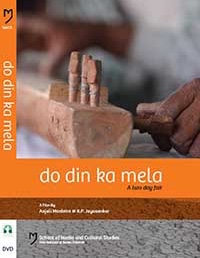Do Din ka Mela
Year: 2009
Language: Kutchi and Gujarati
Subtitles: English
Duration: 60 mins

“Nothing in the world will last – it is but a two day fair” sings Mura Lala Fafal, drawing inspiration from the Sufi traditions of Sant Kabir and Abdul Lateef Bhita’i. He is accompanied on the Jodiya Pava (double flute) by his nephew Kanji Rana Sanjot. Kanji taught himself to play and make his own flutes after hearing the music on the radio. Mura and Kanji are Meghwals, a pastoral Dalit community that lives on the edge of the Great Rann of Kutch, in the Western Indian state of Gujarat. They are both daily wage labourers and subsistence farmers in an a rid zone. The film is a a two day journey into the music and every day life of this uncle-nephew duo, set against the backdrop of the Rann. The Great Rann of Kutch is a vast salt marsh/desert that separates India and Pakistan. Before the Partition the Meghwals moved freely across the Rann, between Sindh (now in Pakistan) and Kutch. The music and culture of the region is a rich tapestry of many traditions and faiths, an affirmation of the syncretic wisdom of the marginalised comunities that live in this spectacular and yet fragile area.
Awards
IDPA Gold for Best Script, IDPA Certificate of Merit, Best Documentary, 2010
Commendation of the Jury, RAI International Ethnographic Film Festival, 2011
Runner Up, We Speak Here Culture Unplugged International Online Film Festival, 2012
National Award: Rajat Kamal for Best Audiography 2012
Festival Selection
Jean Rouch International Film Festival, Paris, 2010
Goettingen International Film Festival, Germany, 2010
JDCA Festival on Art and Artists, Orissa, India, 2010
Vibgyor Film festival, Kerala, India, 2010
Istanbul International Documentary Film Festival, 2010
Viscult Film Festival, Finland, 2010
RAI Film Festival, 2011
Aperture International Ethnographic Film Festival, Melbourne, 2013
